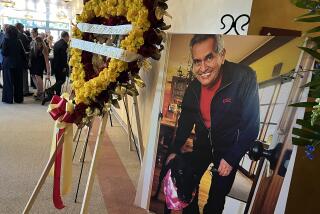Longtime dean of Washington National Cathedral
- Share via
Francis B. Sayre Jr., who as dean of Washington National Cathedral for 27 years oversaw much of its completion and used his pulpit to confront McCarthyism, racial tensions and the Vietnam War, died Oct. 3 at his home on Martha’s Vineyard, Mass. He was 93 and had diabetes.
Sayre, whose grandfather was President Wilson, was appointed to the cathedral in 1951 and quickly became a leading national voice of conscience. As the church’s fifth dean, he also presided over daily operations and focused on finishing the massive Gothic structure whose cornerstone had been placed in 1907.
Washington National Cathedral is now the world’s sixth-largest cathedral and is often regarded as America’s counterpart to England’s Westminster Abbey as a national center for mourning and celebration.
Attracting thousands of followers, Sayre continued the cathedral’s tradition of preaching the social gospel, which applies Christian ethics to matters such as war, race relations and economic inequality.
“Whoever is appointed the dean of the cathedral,” he told the Washington Post in 1977, “has in his hand a marvelous instrument and he’s a coward if he doesn’t use it.”
From the pulpit, he denounced the tactics of Sen. Joseph R. McCarthy at the Wisconsin Republican’s peak of power investigating Communist influence in government and Hollywood. He called McCarthy part of a crew of “pretended patriots” and also chided the American people for letting demagogues achieve prominence.
“There is a devilish indecision about any society that will permit an impostor like McCarthy to caper out front while the main army stands idly by,” he said in a 1954 sermon.
His criticism of politicians extended to presidential candidates, and he once likened Lyndon B. Johnson’s ethical foundations to a termite-ridden house. He did not spare other preachers, reproaching evangelist Billy Graham for overemphasizing personal spiritual renewal and not sufficiently addressing the need for social reform.
“The salvation of the world doesn’t come about by arithmetic,” he said, referring to the mass gatherings hosted by Graham. “There is a dimension to sin that goes beyond the individual.”
Sayre spoke out on the injustice of school segregation in 1953, a year before the U.S. Supreme Court declared racially segregated public schools unlawful. He went on to champion home rule in the District of Columbia in the early 1960s, saying the matter was less about race than maintaining the self-interest of an “oligarchy” led by businessmen who create “apathy and indifference to real social and civic concerns” by denying citizens a vote.
He was later elected to President Kennedy’s Committee on Equal Opportunity and was among a group of several leading Washington-area clergymen to accompany the Rev. Martin Luther King Jr. on his 1965 voting rights march in Selma, Ala.
He spent a decade campaigning for King to speak at the cathedral before prevailing. King gave what became his last Sunday sermon -- a speech favoring civil rights and world peace -- before being assassinated in Memphis on April 4, 1968.
During subsequent years, he opened the cathedral to often-raucous youth religious Masses and antiwar protests. He allowed conductor Leonard Bernstein to lead a free “counter-inaugural” concert in January 1973 against the reelected President Nixon. If Sayre was generally seen as a friend of progressives, he was at least temporarily abandoned by many of them when his 1972 Palm Sunday sermon about the “moral tragedy of mankind” sharply criticized Israel for “oppressing” Arab residents of Jerusalem.
Sayre’s legacy was also in the building itself. Although not officially completed until 1990, the cathedral’s bell tower and nave were finished on his watch. So were a majority of the stained-glass windows, including one containing a moon rock from the Apollo 11 mission.
Trying to rush the construction for the bicentennial celebrations, however, left the church in heavy debt.
Francis Bowes Sayre Jr. was born Jan. 17, 1915, in the White House. He was the fourth grandchild of President Wilson and the firstborn of Wilson’s daughter Jessie, who died in 1933.
His father, a Harvard University law professor, became an assistant secretary of State in the 1930s and was U.S. high commissioner to the Philippines at the time of the Japanese attack on Pearl Harbor in 1941.
The younger Sayre had grown up around the world and graduated from Williams College in 1937 and what is now the Episcopal Divinity School in Cambridge, Mass. He served in the Navy Chaplain Corps during World War II, and afterward oversaw a parish in an industrial part of Cleveland before assuming duties at the National Cathedral at age 36.
His wife, Harriet Hart Sayre, whom he married in 1946, died in 2003.
Survivors include four children and eight grandchildren.
More to Read
Sign up for Essential California
The most important California stories and recommendations in your inbox every morning.
You may occasionally receive promotional content from the Los Angeles Times.













